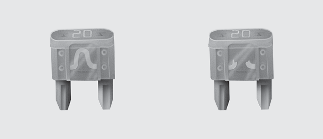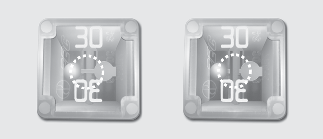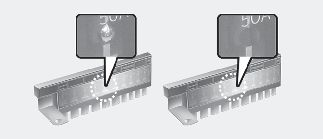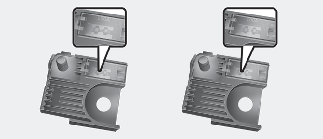Fuses




* Left side: Normal, Right side: Blown
A vehicle’s electrical system is protected from electrical overload damage by fuses.
This vehicle has 2 (or 3) fuse panels, one located in the driver’s side panel bolster, the others in the engine compartment near the battery.
If any of your vehicle’s lights, accessories, or controls do not work, check the appropriate circuit fuse. If a fuse has blown, the element inside the fuse will melt.
If the electrical system does not work, first check the driver’s side fuse panel.
Before replacing a blown fuse, disconnect the negative battery cable.
Always replace a blown fuse with one of the same rating.
If the replacement fuse blows, this indicates an electrical problem. Avoid using the system involved and immediately consult a professional workshop. Kia recommends to consult an authorized Kia dealer/service partner.
Three kinds of fuses are used: blade type for lower amperage rating, cartridge type, and multi fuse for higher amperage ratings.

Fuse replacement
-
Never replace a fuse with anything but another fuse of the same rating.
-
A higher capacity fuse could cause damage and possibly a fire.
-
Never install a wire or aluminum foil instead of the proper fuse even as a temporary repair. It may cause extensive wiring damage and a possible fire.
-
Do not arbitrarily modify or addon electric wiring of the vehicle.

Do not use a screwdriver or any other metal object to remove fuses because it may cause a short circuit and damage the system.

-
When replacing fuse, turn the ignition “OFF” and turn off switches of all electrical devices then remove battery (-) terminal.
-
The actual fuse/relay panel label may differ from equipped items.

-
When replacing a blown fuse or relay with a new one, make sure the new fuse or relay fits tightly into the clips. The incomplete fastening fuse or relay may cause the vehicle wiring and electric systems damage and a possible fire.
-
Do not remove fuses, relays and terminals fastened with bolts or nuts.The fuses, relays and terminals may be fastened incompletely, and it may cause a possible fire. If fuses, relays and terminals fastened with bolts or nuts are blown, consult a professional workshop. Kia recommends to consult an authorized Kia dealer/service partner.
-
Do not input any other objects except fuses or relays into fuse/relay terminals such as a driver or wiring. It may cause contact failure and system malfunction.
-
Do not plug in screwdrivers or aftermarket wiring into the terminal originally designed for fuse and relays only. The electrical system and wiring of the vehicle interior may be damaged or burned due to contact failure.
-
If you directly connect the wire on the taillight or replace the bulb which is over the regulated capacity to install trailers etc., the inner junction block can get burned.

Visually inspect the battery cap to ensure it is securely closed. If the battery cap is not securely closed, moisture may enter the system and damage the electrical components.

Random wiring prohibited when retrofitting equipment
Use of random wiring in the vehicle might cause danger due to failure and damage of the vehicle’s performance.
Using random wires especially when retrofitting Infotainment System or theft alarm system, remote engine control, car phone or radio might damage the vehicle or cause fire.

Remodeling Prohibited
Do not try remodeling the vehicle in any way. It is illegal, and may affect the vehicle’s performance, durability, and safety. Warranty is also not provided for problems caused by remodeling.
Be aware of safety problems caused by remodeling the vehicle with unauthorized electrical devices (lamp, dashboard camera(dash cam), electrical equipment, diagnostic device, communication device, etc.). It might cause malfunction of the vehicle, battery discharge, damage on wiring or connectors, or even fire.

Window tinting precaution
Window tint (especially metallic film) might cause communication disorder or poor radio reception, and malfunction of the automatic lighting system due to excessive change of illumination inside the vehicle. The solution used might also flow into electric, electronic devices causing disorder and failure.